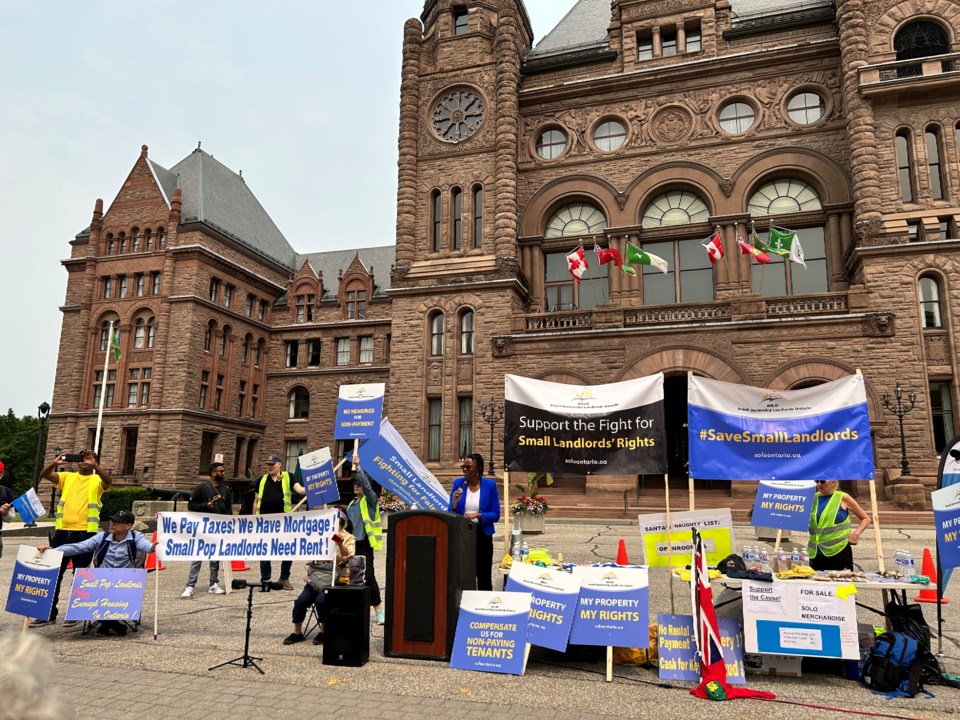EDITOR’S NOTE: This article originally appeared on The Trillium, a new Village Media website devoted exclusively to covering provincial politics at Queen’s Park.
In theory, individual landlords who illegally evict tenants, steal damage deposits or otherwise break the law in Ontario can face fines of up to $50,000. For corporations, it's $250,000.
In reality, only a handful pay more than $2,000.
No landlord faced a fine of more than $10,000, aside from one corporation that was hit for $75,000 four years ago, according to data from the Landlord and Tenant Board (LTB) between 2019–2022 which was obtained by The Trillium.
Fifty-one fines were levied in those four years, or just over one per month, the data show. More than three-quarters were $2,000 or less.
The most common fine was $1,000.
Tenant advocates say the data confirms what they have long suspected, and what the Ford government has refused to verify: that despite plans to double the already-high penalties for bad landlords, enforcement is seriously lacking.
"The police don't step in, bylaw officers don't step in, and with this data, we see the Landlord and Tenant Board is not punishing bad landlords," NDP housing critic Jessica Bell said.
Landlords can often make back the fine amounts in a month or two after illegally evicting a tenant and hiking the rent, advocates noted.
"So, when you're looking at it as a business proposition, it's still advantageous for landlords to conduct themselves in bad faith," said Douglas Kwan, the director of advocacy and legal services at the Advocacy Centre for Tenants Ontario (ACTO).
Landlords face fines when tenants file a complaint and win an adjudicative process with the LTB, a legally binding tribunal outside the court system.
The fines go to the province, not the tenant, though the board can order landlords to compensate tenants.
Only one of the fines was marked as "completed/paid." The rest were either "sent to collections" or "initiated." The LTB did not say by press time how many of the fines the province has actually collected.
Thirty-six of the 51 fines resulted from T2 complaints, meaning a landlord entered a tenant's unit illegally, changed the locks on them, "harassed, interfered with, obstructed, coerced or threatened" them, or "seriously interfered with [a tenant's] reasonable enjoyment of the rental unit or the complex."
Thirteen fines stemmed from T5 complaints, which means the landlord evicted a tenant in bad faith — for example, by saying a family member was moving in when none was.
Five of the fines were T6s, meaning the landlord failed to repair or maintain the unit.
And two were T1s, wherein the landlord owed the tenant money — for example, if they illegally kept the damage deposit, or overcharged for rent.
(The number of fines doesn't add up to 51 because some fines resulted from multiple complaints.)
Illegal evictions are incentivized in Ontario because, while landlords are only allowed to raise the rent by a few per cent per year if the same tenant stays in the unit, they can raise it by however much they want between tenants, Kwan said.
His organization has found a "significant increase" in the number of these "own-use" evictions over the past few years, he said.
The fact that only 13 have been successfully fought at the LTB is proof that Ontario needs a cap on rent raises between tenants, Bell said.
"Most illegal evictions are informal. The landlord just tells the tenant they need to move out and the tenant does it because they know the laws aren't going to protect them," she said. "The data we're seeing here shows the very few ... extremely motivated tenants who have volunteered their time to hold a landlord to account."
A recent ombudsman report found tenant applications could take up to two years to be scheduled. Landlords wait six to nine months.
"That’s discrimination, plain and simple," Bell said.
The government has doubled the number of adjudicators, which Attorney General Doug Downey has said will speed things up soon.
Police and bylaw officers should step up enforcement, advocates said.
"If I go and rip off $300 from a Tim Hortons, we don't go to the Tim Hortons company and say ... you can go to small claims court to get that money back," said Geordie Dent, the executive director of the Federation of Metro Tenants Associations. "But when a landlord steals $300 from a tenant ... that's exactly what we say."
Kwan said the province should also change the look of eviction notices. The own-use N12 form states clearly on the front page that the landlord wants to evict the tenant, and shows a date for the proposed end of the tenancy.
Tenants are only told about their right to challenge the eviction on the second page, in the middle of a lot of text, Kwan noted.
"If the forms stated up front that tenants have a right to security of tenure and can challenge this notice simply by waiting for the landlord to apply to the Board then we would see far fewer informal evictions," he said.
Six landlord corporations were fined over the four years, compared to 41 individuals.
The Trillium also asked Tribunals Ontario, which oversees the LTB, how many times it has ordered landlords to allow a tenant to return to a home the landlord evicted them from, and how many times the landlord has complied. The LTB said it doesn't track the outcomes of its orders.
Housing Minister Steve Clark's office didn't respond to a request for comment.
